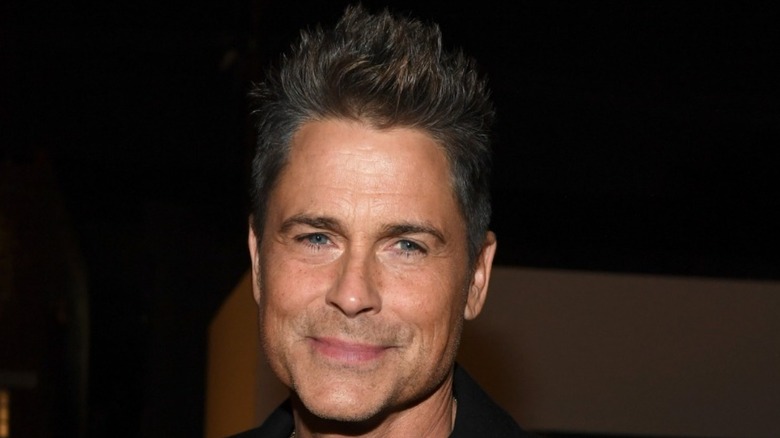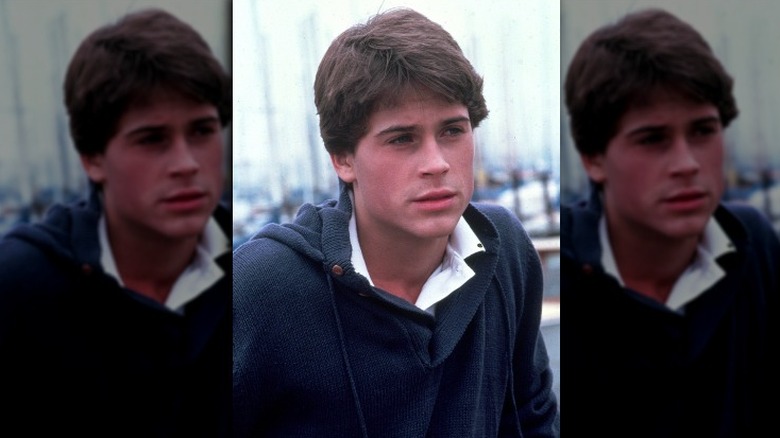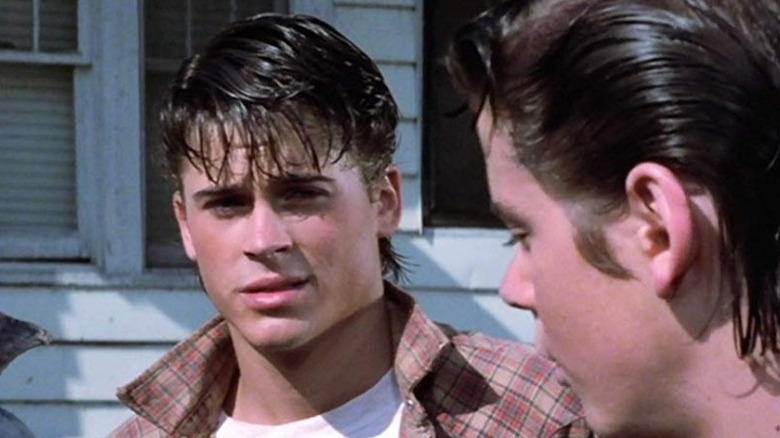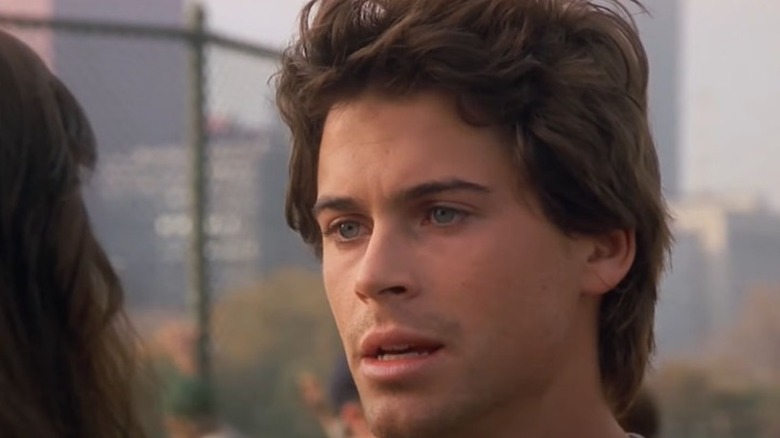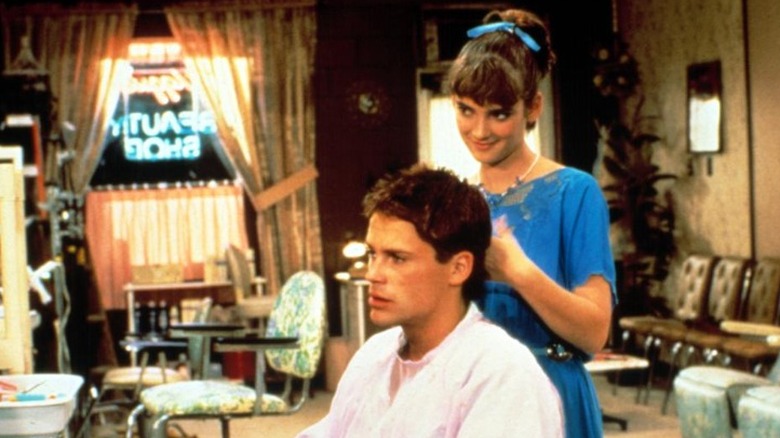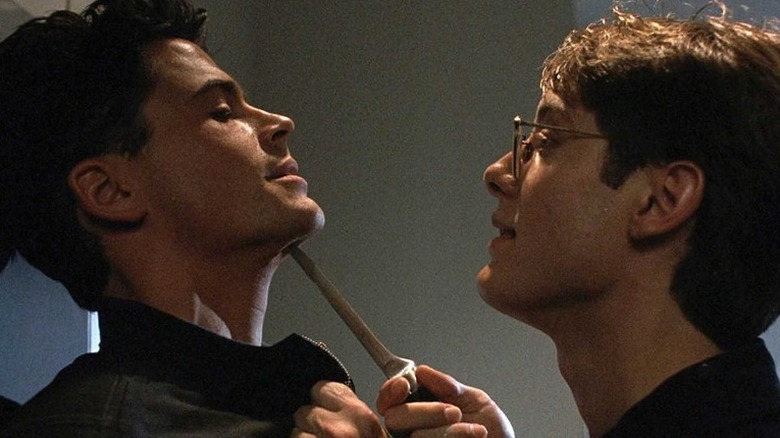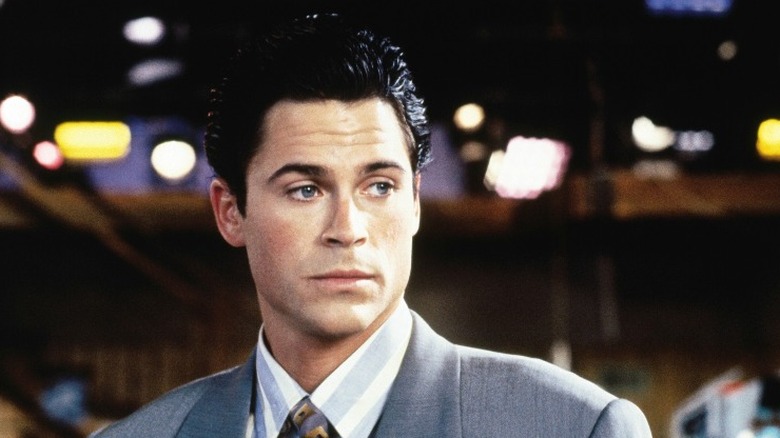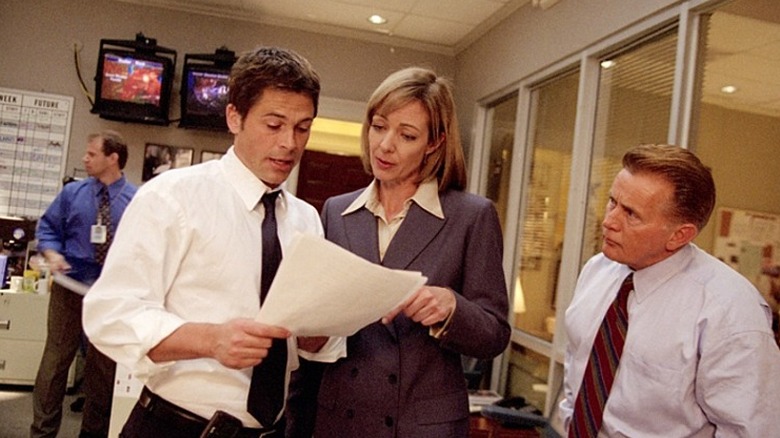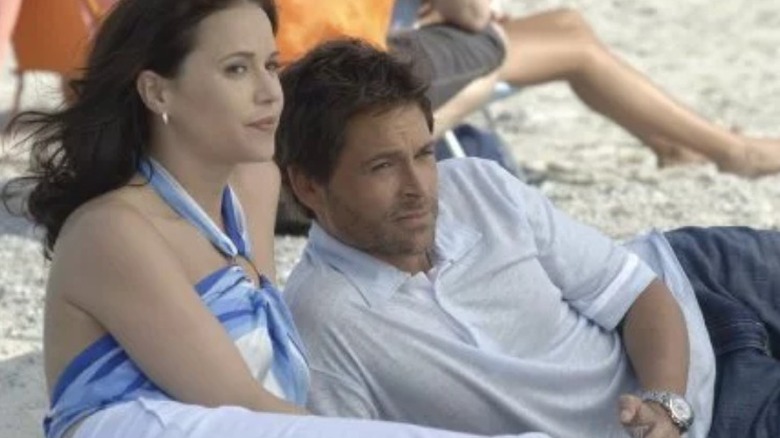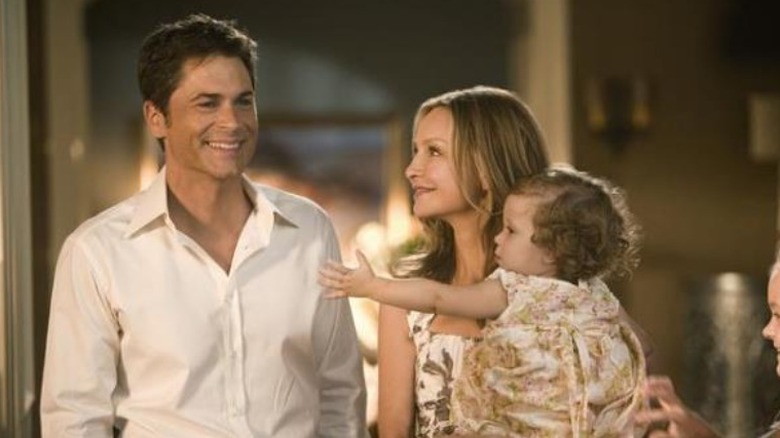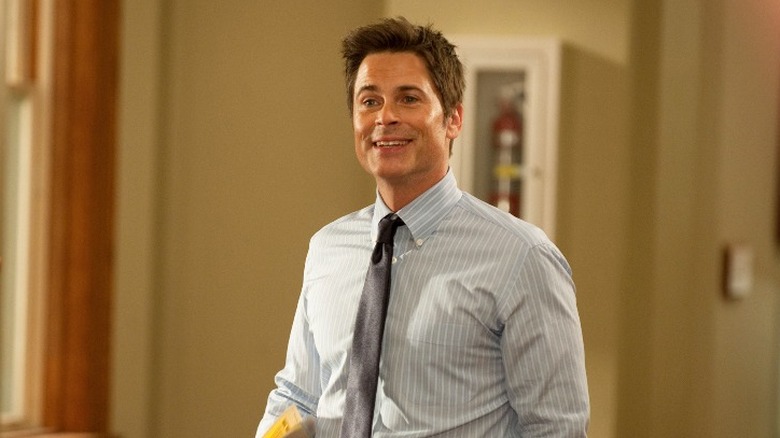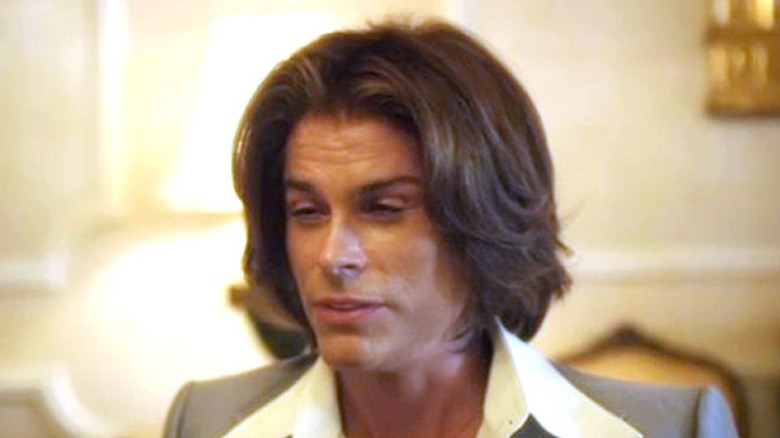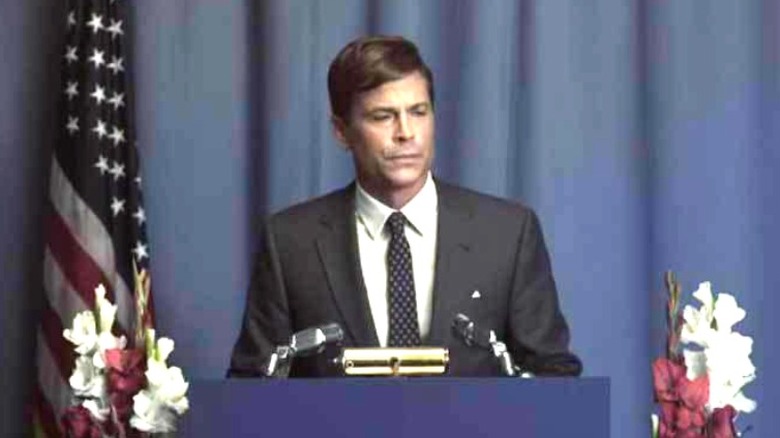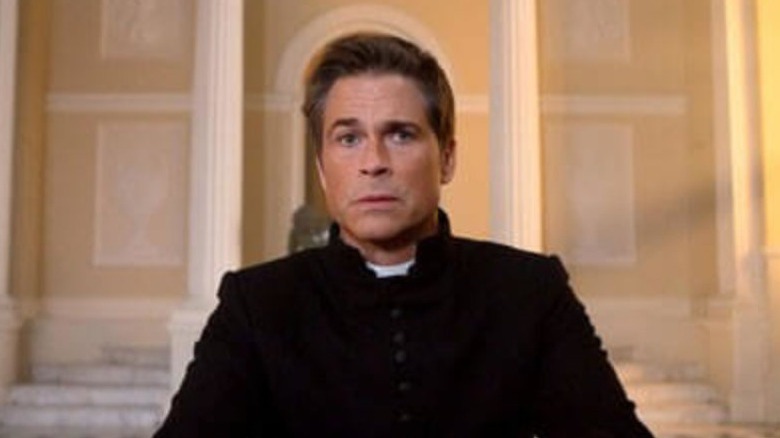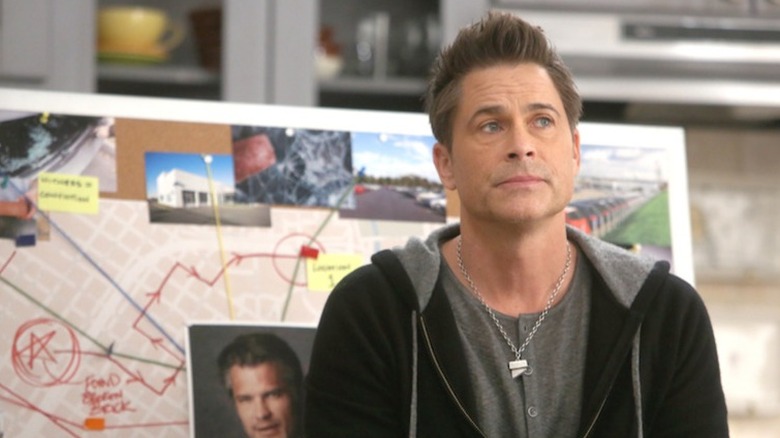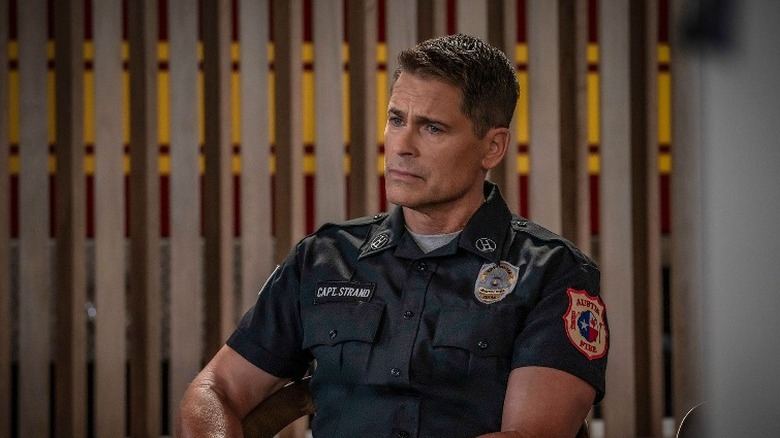Rob Lowe's Best Onscreen Appearances
We may receive a commission on purchases made from links.
When an actor is as good-looking as Rob Lowe, it is really easy for the world to focus on their appearance rather than their abilities. In a review of his autobiography, "Stories I Only Tell My Friends," the New York Times stated that he was "so good looking that it's almost a liability." And yes, it is true that Lowe's defined jawline, crystal blue eyes, and thick head of hair are fantastic — but so too are his acting chops.
Lowe is a natural talent (he never went to acting school), and his on-screen magnetism and natural charisma are rare traits. His first onscreen acting role was as Tony Flanagan in 1979 ABC sitcom "A New Kind of Family." While "A New Kind of Family" was quickly cancelled, that wasn't the end for Lowe –- we all know he has had an illustrious career spanning many decades. Though the handsome star has weathered some personal struggles, embarrassing scandals, and career missteps, he has proved time and time again that he can bounce back stronger than ever. Here are some of Lowe's best onscreen appearances.
Thursday's Child
Lowe's first big break came in 1983, when he appeared in the TV movie "Thursday's Child" alongside Gena Rowlands and Don Murray (as his mother and father). According to Turner Classic Movies, Lowe was "introduced" in the film, despite already having a couple of acting credits to his name. In the movie -– based on a book by Victoria Poole -– a star athlete learns he is suffering from a debilitating heart condition.
Lowe plays the main character, Sam Alden, who must handle his illness and the grapples with realization that he'll need a heart transplant to survive. Lowe's charming demeanor and intense screen presence was palpable even back then, and the role resulted in Lowe's first Golden Globe nomination (for Best Supporting Actor in a Series, Miniseries, or Television Film), as well as an increase in profile for the then-teenage actor.
The Outsiders
Lowe's other big break also came in 1983, when he appeared in Francis Ford Coppola's "The Outsiders," alongside a plethora of future Hollywood big shots like C. Thomas Howell, Tom Cruise, Patrick Swayze, Matt Dillon, and Diane Lane. Though he has often expressed disappointment that his part was drastically cut, "The Outsiders" is the movie that really put Lowe on the map.
Lowe's role was that of Sodapop Curtis, one of three "greaser" brothers living in the 1960s Midwest who, together with a few other misfits, take on rival posh kids across town. To star as a kid from the wrong side of the tracks, Coppola had Lowe and his co-stars immerse themselves in that world as research –- tasking them with playing tackle football with local gang members, and even having them stay overnight in the homes of former greasers.
The movie seems to be very close to Lowe's heart. "Every seventh grader in the country, pretty much, is required to read the book and, of course, they see the movie," Lowe said to Vanity Fair. "So, every year, I get 13-year-olds who lose their mind. That is an amazing gift as an actor. I'll always kind of be frozen in time. That's very special I have to say." Lowe has stated that he was not sure he was going to make it in acting, even considering an alternate path, at the time that he scored his gig in "The Outsiders" (per People).
About Last Night...
After "The Outsiders," Lowe started getting starring roles in films like "St. Elmo's Fire" and "Youngblood" – but it wasn't until 1986's "About Last Night..." that Lowe really started to capitalize on his potential as a leading man. He appeared as Danny Martin, a Chicagoan who pursues a relationship with a woman named Debbie Sullivan (Demi Moore) after sleeping with her on the first date. The movie is somewhat of a precursor for more recent movies like "No Strings Attached" and "Friends With Benefits," which also focus on casual sex that doesn't wind up being very casual.
Since neither Danny nor Debbie have much relationship experience, and because they have some overly involved friends (played by James Belushi and Elizabeth Perkins), their relationship comes with its fair share of complications. "About Last Night..." received mixed reviews, but had support from some critics — most notably Roger Ebert. Not only did Ebert give the film four stars, but he also praised the lead performances. "Lowe and Moore, members of Hollywood's 'Brat Pack,' are survivors of last summer's awful movie about yuppie singles, 'St. Elmo's Fire.' This is the movie 'St. Elmo's Fire' should have been," he wrote in his review, going on to say that the film gave "them the best acting opportunities either one has ever had, and they make the most of them."
Square Dance
In 1987's "Square Dance," Lowe played Rory Torrance, an intellectually disabled man. Rory befriends Gemma (Winona Ryder), a 13-year-old girl who has moved from her grandfather's house in rural Texas to Fort Worth in order to live with her mother (Jane Alexander). The film -– also known under its television broadcast title, "Home Is Where the Heart Is" –- was a flop, but Lowe's performance garnered some praise.
Vincent Canby of the New York Times called Lowe's performance "arresting," and in her review for the Chicago Tribune, critic Johanna Steinmetz praised Lowe, despite taking issue with the movie as a whole. She wrote, "The young matinee idol performs credibly in casting that is so against type that his scenes provoked a few hyena-like cackles during a recent screening. The man deserves better." Despite the lack of love for "Square Dance" as a film, Lowe received his second Golden Globe nomination for his part.
Bad Influence
By the late 1980s, Lowe's personal issues –- namely a sex scandal involving him, a 16-year-old, and a video camera -– were getting more attention than his acting career. His first post-scandal film was the 1990 thriller "Bad Influence," and it was actually quite good. Even Lowe is a fan of it, telling A.V. Club in 2017 that he feels the movie was "ahead of its time" and calling it "sexy," "weird," and "dark."
In "Bad Influence," Lowe plays Alex, who befriends a more innocent man named Michael Boll, played by James Spader. Alex is mysterious, manipulative, and dangerous, and his relationship with Michael quickly turns toxic. Not only does Alex underhandedly ruin Michael's engagement to Ruth (Marcia Cross), but he also attempts to frame him for murder. Critic Roger Ebert called Lowe "slick and likable," though he also acknowledged the eerie overlap between Lowe's real-life scandal and portions of the film, like a scene that has Alex bedding two women, and another with a videotaped sexual encounter.
Wayne's World
In 1992, Lowe appeared as ruthless businessman Benjamin Kane in "Wayne's World," which featured Mike Myers and Dana Carvey as their famous "Saturday Night Live" characters Wayne Campbell and Garth Algar. Benjamin is a cut-throat executive whose pretty exterior contrasts with his smarmy personality. He buys the rights to Wayne and Garth's show in order to exploit them for his own monetary gain, and he employs underhanded tactics to get his way. He also attempts to steal Wayne's girlfriend, singer Cassandra Wong (Tia Carrere).
Famed critic Gene Siskel called Lowe's casting as the slimy yuppie "inspired." For his part, Lowe very much enjoyed playing against-type. In a video interview with Vanity Fair, Lowe said "Benjamin was a really, really fun character for me to do," and noted that it kicked off a "mini career" as a good looking jerk. He credits the film with getting him other opportunities to be the bad guy, such as in "Tommy Boy" and "Austin Powers." "Wayne's World" was a huge box office hit, and Lowe's career was on the rebound.
The West Wing
When Lowe started on "The West Wing" in 1999, few could have predicted how impactful the role would be on his career. His performance as White House Deputy Communications Director Sam Seaborn remains perhaps his most acclaimed role to date, earning him Golden Globe and Emmy nominations — as well as multiple Screen Actors Guild awards as a member of the cast.
"I never really had this in my career, ever," Lowe said to Vanity Fair of his reaction to the role. "I was like, 'Oh, I'm this guy.'" Aaron Sorkin agreed, and Lowe remained on "The West Wing" for four seasons, reportedly departing because of issues with his salary and his dislike of being a part of a large ensemble — one where he was somewhat overshadowed (via Entertainment Weekly). As the show progressed, Lowe's role gradually declined in importance, and he claimed that he no longer found the character relevant (though he did return in the final season).
Beach Girls
In the years following "The West Wing," Lowe continued to focus on television, taking on the lead in two failed television series ("The Lyon's Den" and "Dr. Vegas") and starring in a couple of miniseries and TV movies. The six-episode "Beach Girls" –- in which Lowe starred as a grieving widower — was the standout amongst them. The 2005 Lifetime miniseries co-starred Julia Ormond and Cloris Leachman.
Based on the novel by Luanne Rice, Lowe plays Jack Kilvert in the miniseries. He's the widow of one of the three "beach girls," who spent their summers together in a small beach town (Hubbard's Point) when they were growing up. After his wife's death, Jack and his daughter Nell (Chelsea Hobbs) set out for Hubbard's Point so they can connect with their dearly departed family member. The role is notable, as it marked the now 41-year-old Lowe's transition into playing parents.
Brothers & Sisters
When Lowe started on the ABC family drama "Brothers & Sisters," back in 2006, it was originally little more than a guest role. But after good notices as Senator Robert McCallister, he was quickly promoted to series regular status. Lowe's Republican Senator was the love interest for Calista Flockhart's Kitty, a conservative pundit and a member of the complicated but loving Walker family. Throughout his time on the series, Lowe was given much to do, as his character got married, ran for president (and lost in the Republican primary), dealt with scandal, adopted a baby, and suffered a heart attack.
As he did with "The West Wing," Lowe left "Brothers & Sisters" after four seasons –- this time because he thought the writers had run out of steam. "I left 'Brothers & Sisters' when they ran out of storytelling runway," he told GQ magazine. "I mean, there are so many family dinners you can do. I eventually had to go to them and say, 'Look, I don't do spatula work. I don't do scenes with oven mitts. If you're looking for that, you've got the wrong guy. I'm not doing scenes about casseroles. It's not happening.'" Lowe's character was killed off in Season 5, after a Season 4 car accident put him into a coma.
Parks and Recreation
After leaving "Brothers & Sisters," Lowe took on another great television role — this time as Chris Traeger on NBC's "Parks and Recreation." Once again, Lowe was expected to be a recurring guest –- arriving in season two alongside Adam Scott's Ben Wyatt –- but soon signed on to be a series regular rather. State auditor Chris's overly chipper demeanor and hyper-focus on health and wellness were hilarious, and Lowe's character even developed his own catchphrase -– literally.
Lowe left the series in Season 6, at the same time as Rashida Jones, who played his girlfriend Ann Perkins. In a Vanity Fair interview, Lowe called his casting a "shotgun marriage," and explained that they all understood very early into his six episode "trial" that things gelled. He also sees himself as very similar to Chris, explaining that the writers took his own energy, enthusiasm, and optimism "and they just mainlined it."
Behind the Candelabra
Heavy makeup ensured that Lowe looked incredibly creepy in 2013's "Behind the Candelabra," an HBO biopic about Liberace (Michael Douglas) from director Stephen Soderbergh. And even though his face and hair looked foul, Lowe's work as plastic surgeon Dr. Jack Startz was beautiful. The actor earned a Golden Globe nomination (for Best Supporting Actor in a Series, Miniseries, or Television Film) for playing Dr. Startz, who was tasked with helping transform Liberace's lover, Scott Thorson (Matt Damon), into a molded version of Liberace himself.
Lowe's performance was praised by critics. For instance, The Spectator's Deborah Ross called him "sublimely creepy" and The Denver Post's Joanne Ostrow wrote that Lowe "is a perfect parody of 1970s Hollywood." Both Jon Frosch of The Atlantic and Time Out's Dave Calhoun called Lowe "hilarious" in the role. Reviews for the Los Angeles Times and the New Republic also mentioned the humor Lowe brought to the biopic.
Killing Kennedy
With 2013's TV movie "Killing Kennedy," Lowe took on a real-life president –- John F. Kennedy –- and received his first individual Screen Actors Guild nomination for the role. Based upon a book by Bill O'Reilly and Martin Dugard, "Killing Kennedy" aired on the National Geographic Channel, setting a network viewership record with 3.4 million viewers for the premiere. The movie –- which co-stars Will Rothhaar as killer Lee Harvey Oswald, Ginnifer Goodwin as Jackie Kennedy, and Michelle Tratchenberg, as Oswald's widow Marie –- traced Kennedy's life through his rise to the presidency, his time in office, and his tragic assassination.
Critical response for the film was mixed, and Lowe's performance was not praised across the board. Jeff Jenson of Entertainment Weekly called him "effective" in the part, and while the Boston Herald's Mark Perigard called Lowe "solid as JFK," praising his decision to refrain for a parodical accent. Variety critiqued the choice, with critic Brian Lowry writing that Lowe "settles for an intermittent accent ...without conveying any of the president's charisma." The actors in Hollywood clearly disagreed, given the aforementioned SAG nod.
You, Me, and the Apocalypse
Some of Lowe's best work has been in television movies and miniseries, and his turn in "You, Me, and the Apocalypse" was especially memorable. Lowe played Father Jude Sutton, a priest working at the Vatican in the office of the Devil's Advocate, helping to canonize potential saints and track down the antichrist. Father Jude is a chain-smoking, alcohol-drinking, curse word-spewing priest who does not quite abide by the rule of abstinence.
Though it aired on NBC after premiering on Sky 1 in Britain, "You, Me, and the Apocalypse" had a lower profile than many of Lowe's other projects. Nonetheless, reviews were favorable -– both from audiences and critics. Indiewire's Ben Travers wrote that Lowe "continues that hot streak here, providing a spark of life to the pilot (from a humor standpoint) and knocking us back in a dramatic encounter with a suicidal abuse victim later on." Writing for The Guardian, Brian Moylan said "Lowe proves that he should have been in comedy all along as a priest with a rebellious streak." Even Salon -– which gave the project a poor review -– singled out Lowe, praising his "smarmy priest" in the title of their article.
The Grinder
"The Grinder" is a classic case of a good show canceled way too soon, and it's home to one of Lowe's career best onscreen performances. In the one-season sitcom, Lowe plays Dean Sanderson, former television star of a procedural show called "The Grinder." After the show ends, Dean moves back home to Idaho to work at his family's law practice, convinced that playing a lawyer on TV has provided him with enough experience to work at the firm. This comes as an annoyance to his brother Stewart (Fred Savage), who also works at the firm run by their father, Dean Sr. (William Devane).
Though the show did not catch on with audiences, Lowe earned a Golden Globe nomination for Best Actor in a Musical or Comedy television show, and critics applauded both the show and the performance. Entertainment Weekly's Jeff Jensen called Lowe "an actor who has become ridiculously successful at playing endearingly vain," and many other critics praised the chemistry between Lowe and Savage. Jensen also said that Lowe gives a "performance that owes so much to Rob Lowe's Rob Loweness and yet makes you completely forget about Rob Lowe," which is a sentence we don't quite understand but somehow love anyway.
9-1-1: Lone Star
Lowe currently stars on "9-1-1: Lone Star," an offshoot of Fox's popular procedural "9-1-1," which began in 2020 and is heading into its third season. He plays Owen Strand, a fire captain who relocates to Austin, Texas, from New York City, where he lost his entire firehouse in the September 11 terror attacks. Owen's son T.K. (Ronen Rubenstein) is a recovering addict and fellow firefighter (and later paramedic), and their complicated father-son dynamic is one of the highlights of the show. Owen is fiercely committed to his team -– and his skin care routine, in typical Lowe fashion -– even when it conflicts with his own best interest.
"It's big, it's massive, it's gritty. It's a great part, a great cast," Lowe told Vanity Fair. When the show premiered, USA Today critic Kelly Lawlor wrote that "Lowe is the real anchor, and he never fails to deliver his trademark charm." Writing for the Hollywood Reporter, Daniel Fienberg said Lowe is "the sort of charismatic centerpiece you'd want for a show like this and this latest deconstruction of his persona has some different shadings." Many critics also commented on how vain, looks-obsessed, health freak Owen is eerily similar to Lowe himself, with the Ringer saying it best: "Owen is basically just Rob Lowe in a firefighter outfit." But hey, if the formula isn't broke, don't fix it.
